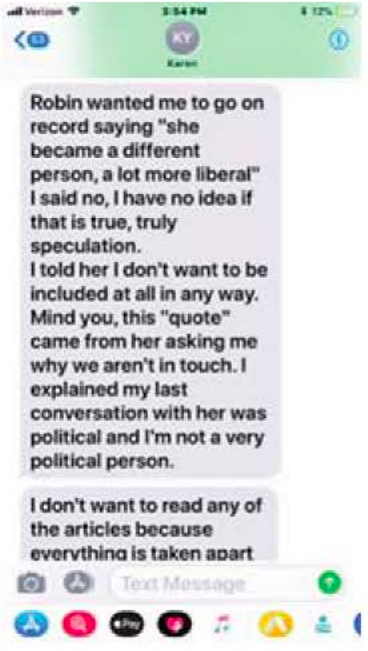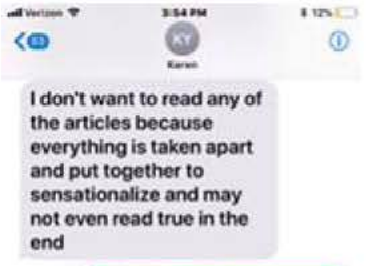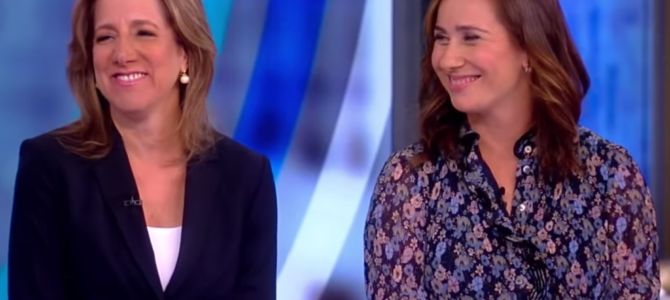Year-old texts contained in a Senate Judiciary Committee report show that New York Times reporter Robin Pogrebin engaged in questionable journalistic tactics to shape a false narrative against Kavanaugh by telling a source what to say and by asking sources to confirm information she herself had given them. And despite including a highly opinionated discussion of the text exchange in their book, the authors never admitted that Pogrebin was a key player in the exchanges.
Pogrebin made a bizarre and unsupported claim this week that Supreme Court Justice Brett Kavanaugh had told her to lie. It turned out Pogrebin had mischaracterized discussions with the Supreme Court’s public information officer, not Kavanaugh, who had merely explained the terms of an off-the-record interview that was being sought and never obtained. Despite the many errors and false claims Pogrebin and her co-author Kate Kelly made, corporate media picked up on this false statement as if it were true.
A 2018 text exchange between Karen Yarasavage and Kerry Berchem shows them discussing Deborah Ramirez’s claim against Kavanaugh. Yarasavage was extremely close to Ramirez — having asked Ramirez to be a godmother to one of her children — and knew Kavanaugh well, too. Berchem was younger and not at Yale when the alleged incident was said to have taken place. While in reality, the text exchanges show Berchem trying to get Yarasavage to say something supportive of Ramirez’s claim, even though Yarasavage said she’d never even heard of any such incident and felt confident she would have if it had happened, the media characterized the discussions as evidence of Kavanaugh’s guilt.
In their book, Pogrebin and Kelly continue the media narrative that the exchanges were the opposite of what they were. They write that discussions of media inquiries to find anti-Kavanaugh dirt in the summer instead “raised questions as to whether Kavanaugh and his friends or representatives had been trying to influence events as far back as July.” The exchanges “had started with seemingly innocent social contacts, but — in the context of the Ford and Ramirez allegations — they had taken on importance as potentially relevant material to show the FBI.”
Berchem’s repeated efforts to get Yarasavage not to defend Kavanaugh, sprinkled with Berchem’s political opposition to all things Trump-related, were instead portrayed as Yarasavage and other Kavanaugh friends trying to shape the narrative. The truth of the exchange is explained in “Justice on Trial: The Kavanaugh Confirmation and the Future of the Supreme Court,” co-authored by this writer.
Pogrebin and Kelly quote many snippets of the texts without revealing what the women said about Pogrebin herself. Pogrebin briefly discloses that she went to Yale University with Kavanaugh and Ramirez. She used those connections to call up old classmates and sell a book, although she and her co-author now are trying to present themselves as objective reporters.
What Yarasavage, in particular, said was quite relevant. Yarasavage noted that Pogrebin had called her up as an old Yale friend, failing to note that the culture reporter at the New York Times was actually trying to write a hit piece on Kavanaugh.
Then, she writes, Pogrebin tried to get her to say a specific quote that would suggest the fiercely independent Yarasavage was politically motivated to defend Kavanaugh.
Robin wanted me to go on record saying “she became a different person, a lot more liberal” I said no, I have no idea if that is true, truly speculation. I told her I don’t want to be included at all in any way. Mind you, this “quote” came from her asking me why we aren’t in touch. I explained my last conversation with her was political and I’m not a very political person. I don’t want to read any of the articles because everything is taken apart and put together to sensationalize and may not even read true in the end. I actually can’t believe the New Yorker story ran. It really doesn’t read well
Pogrebin didn’t mention her own role in these text exchanges. Neither did she mention that she’d spread gossip about Ramirez and then asked Pogrebin and Berchem if they’d heard about it. At least in Yarasavage’s case, she’d heard it — from Pogrebin herself.
“She just asked me if Debbi transferred to Pierson? Do u know?” Berchem asked. “Ha, she asked me too!” Yarasavage responded. “She’s the one who told ME that Debbie transferred from Stiles to Pierson”
Ezra Stiles is the college at Yale University that Kavanaugh was in. Pogrebin was extremely close to one of the central anti-Kavanaugh activists, Kathy Charlton, during the confirmation fight. Charlton was one of the major players in the anti-Kavanaugh effort — Monica McLean being another — whose role Pogrebin and Kelly strategically downplayed.
Images of portions of the text exchanges are below.

















